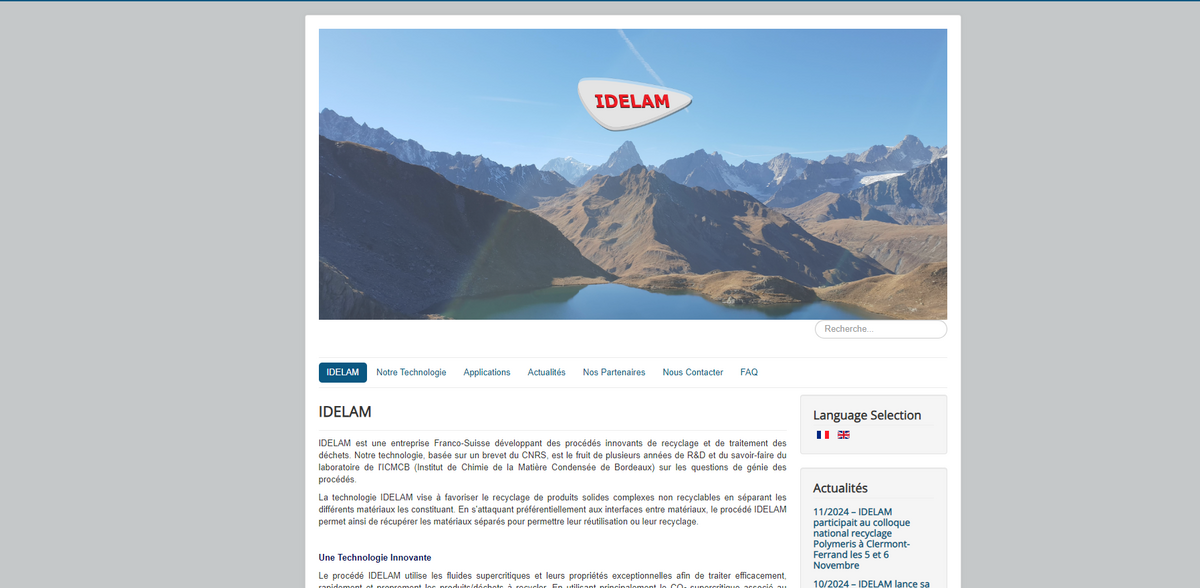What is the IDELAM Project?
IDELAM is a Franco-Swiss company developing innovative recycling and waste treatment processes that are, honestly, quite groundbreaking. Based on a CNRS patent and several years of R&D, the technology draws on the deep expertise of the ICMCB (Institute of Chemistry of Condensed Matter of Bordeaux) laboratory. Essentially, the IDELAM technology is designed to promote the recycling of complex non-recyclable solid products by focusing on one key element: the interfaces between materials. By targeting these primary zones, the process efficiently separates the different materials in a product, making it possible to recover and reuse or recycle them—almost like giving waste a second life.
Main Benefits and Key Facts
The main benefit of the IDELAM approach lies in its innovative use of supercritical fluids, particularly supercritical CO₂. This approach brings several key figures and facts to the table:
- Based on a robust CNRS patent and several years of dedicated R&D.
- Utilizes supercritical CO₂ to treat products quickly, cleanly, and at low energy.
- Transforms solid glues into gases under precise conditions of temperature, pressure, and time.
- Uses a solvent in supercritical conditions to effectively delaminate layers in multi-layer waste.
- Tailored for a wide range of applications—from food packaging to technical products like solar panels and skis.
These points highlight just how versatile and robust the IDELAM process is, making it a promising solution in the realm of complex waste recycling.
Innovative Technology Approach
By harnessing the power of supercritical fluids, the IDELAM process is paving the way with its innovative technology. Using supercritical CO₂, the process is not only efficient but also clean and low in energy consumption. It becomes clear that, thanks to the exceptional properties of supercritical fluids, the treatment and recycling of waste are done in a remarkably fast and clean manner. The process works by altering the state of adhesives—turning stubborn solid glues into absorbable gas that can be looped back into the system. This clever transformation is one of those rare instances where scientific insight meets real-world application, delivering both performance and environmental benefits. It’s almost as if the process gives a whole new meaning to “delamination.”
Versatility in Recycling Applications
One of the most exciting aspects of the IDELAM technology is its versatility. The process is applicable to virtually any complex product made up of several bonded materials. This includes everyday products like milk cartons, pouches, and coffee capsules, which many might assume are difficult to recycle. Beyond food packaging, the technology extends to textile and fashion items such as shoes or glued accessories. Even products with more technical applications—ranging from skis to photovoltaic panels and smart cards—can be effectively treated using this innovative process. The flexibility offered by variations in operating conditions (temperature, pressure, etc.) means that the process adapts like a chameleon to the challenges of multi-material waste, delivering a solution that is both robust and broadly applicable.
Expertise and Equipment Provider
The success of any advanced recycling technology hinges not only on the process but also on the expertise behind it. In this regard, the IDELAM project stands out, boasting over 50 years of combined experience in recycling equipment and process engineering. The technical team based in Pessac is renowned for their specialization in supercritical solvothermal processes and materials chemistry. Their role is pivotal—they answer technical questions, plan test trials on products, and ultimately ensure that every piece of complex waste is handled properly. With such a strong background, the team is able to offer tailored solutions that meet specific recycling needs. It’s a blend of high technology and deep know-how that gives the IDELAM solution its competitive edge.
Advanced Process Engineering for Multi-Material Recycling
At the heart of the IDELAM innovation is an advanced process engineering methodology carefully developed through years of research and practical testing. The process uses a proven supercritical technology reactor—which has been demonstrated on a variety of waste streams—to achieve fast delamination of multi-layer materials. For instance, the use of a specialized solvent under structured supercritical conditions causes the transformation of tough adhesives into gases, a process that is both imaginative and efficient. This means that even the most complex products, which traditionally posed significant recycling challenges, can now be processed in a way that minimizes energy consumption and maximizes material recovery. The approach is not just inventive, but also practical and adaptable to evolving waste management needs.
Project Impact: Sustainable Development Goals
- SDG 9: Industry, Innovation, and Infrastructure – Promoting cutting-edge recycling technologies.
- SDG 12: Responsible Consumption and Production – Encouraging sustainable waste management practices.
- SDG 13: Climate Action – Reducing energy usage and greenhouse gas emissions through cleaner recycling methods.
- SDG 15: Life on Land – Supporting better management of waste to preserve natural ecosystems.
The Future of Waste Recycling
Looking ahead, the IDELAM TPS innovative recycling process is set to open a new era in the recycling of multi-layer products and packaging waste. The future of waste recycling appears increasingly promising as projects targeting complex multimaterial wastes move from concept to implementation. Focus areas include food packagings, drug blisters, cosmetic packages, and even specialized technical products like solar panels, credit cards, and skis. The inherent flexibility of the supercritical CO₂ process, combined with a forward-thinking approach to process engineering, means that IDELAM will likely continue to lead the way in delivering effective, low-energy, and environmentally friendly recycling solutions. It’s a future where recycling isn’t just about handling waste—it’s about reimagining materials and resources in a smarter, cleaner, and more sustainable way…


















